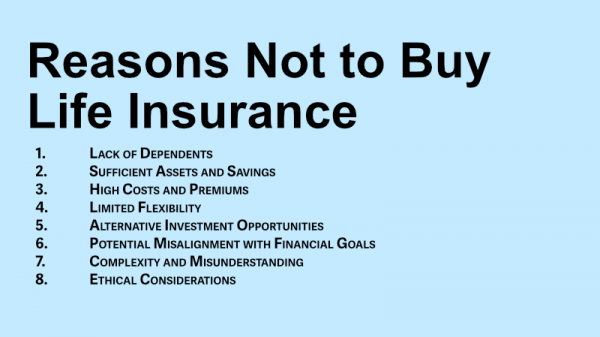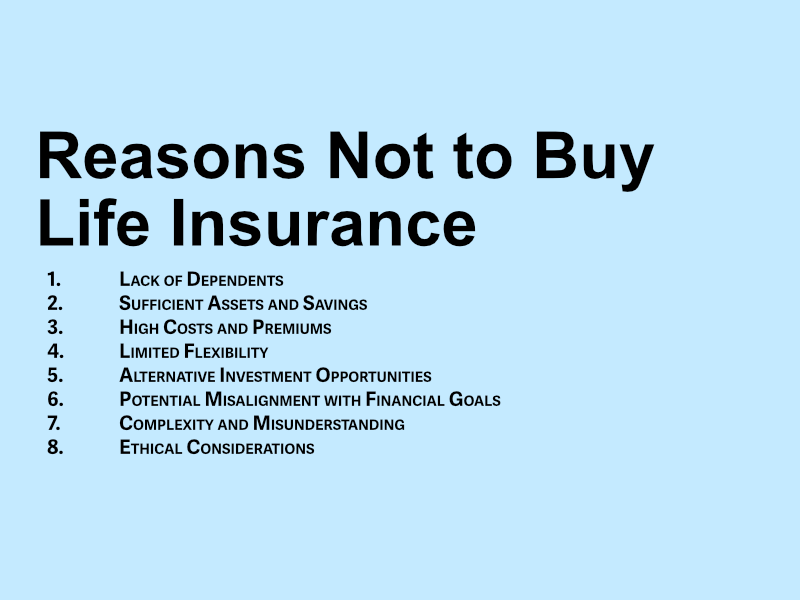8 Reasons Not to Buy Life Insurance: A Comprehensive Analysis
Life insurance is a cornerstone of financial planning for many individuals and families. It offers a safety net, ensuring that loved ones are financially secure in the event of an untimely death. The concept is simple: policyholders pay regular premiums, and in return, the insurance company provides a lump-sum payment, known as a death benefit, to beneficiaries if the policyholder passes away.
In the United States, life insurance is a substantial industry, with approximately 60% of American adults owning some form of life insurance, according to a 2020 study by the Insurance Information Institute. The market is filled with various types of policies, ranging from term life, which provides coverage for a specific period, to whole life, offering lifelong coverage and a cash value component.
Despite its popularity and the peace of mind it can provide, life insurance is not universally applicable. It’s a product that must be carefully matched to individual needs, financial goals, family structure, and even ethical considerations. Misunderstanding or misalignment with these factors can lead to dissatisfaction or financial inefficiency.
The decision to buy life insurance is often influenced by marketing, societal norms, or well-intentioned advice from friends and family. However, it’s a decision that requires careful consideration and personal reflection. Not everyone will benefit from life insurance, and for some, it may even be an unnecessary expense.
In this comprehensive analysis, we’ll explore “reasons not to buy life insurance” and delve into the various factors that might lead someone to opt-out of this financial product. From the lack of dependents to high costs and premiums, limited flexibility, alternative investment opportunities, potential misalignment with financial goals, complexity, and ethical considerations, we’ll examine the multifaceted reasons why life insurance may not be the right choice for everyone. Whether you’re considering purchasing a policy or reevaluating your existing coverage, this article aims to provide insights and perspectives that may guide your decision-making process.
1. Lack of Dependents
Life insurance is primarily designed to provide financial support to dependents. However, not everyone has dependents who rely on their income. According to the U.S. Census Bureau, around 28% of households in 2020 were made up of individuals living alone. For these individuals, life insurance may not be necessary, as there are no dependents to protect financially.
Without dependents, the death benefit of a life insurance policy may not serve a clear purpose. The premiums paid into the policy could potentially be better utilized elsewhere, such as in retirement savings or other investments. It’s essential to evaluate personal circumstances and financial responsibilities before purchasing life insurance.
For those without dependents but concerned about final expenses, other financial products like funeral or burial insurance might be more appropriate. These specialized policies can cover end-of-life expenses without the broader coverage (and cost) of traditional life insurance.
2. Sufficient Assets and Savings
Life insurance is often purchased to ensure that dependents have financial support in the event of the policyholder’s death. However, for individuals with substantial assets and savings, life insurance may be redundant. According to the Federal Reserve, the median net worth of American families was $121,700 in 2019.
For those with significant assets, these funds can provide financial security for dependents without the need for life insurance. It’s essential to conduct a thorough analysis of financial needs, including potential future expenses like education and housing, to determine if existing assets are sufficient.
If assets and savings are adequate to cover future financial needs, life insurance may not only be unnecessary but also an inefficient use of funds. The premiums paid for life insurance could be invested elsewhere to potentially generate higher returns.
3. High Costs and Premiums
Life insurance premiums can be a significant financial burden, especially for whole life or universal life policies. According to the Insurance Information Institute, the average annual premium for a 20-year term life insurance policy for a 35-year-old non-smoker was $227 in 2020. Whole life policies can be substantially more expensive.
The cost of life insurance may not justify the potential benefits for those who are young, healthy, and without significant financial obligations. It’s crucial to weigh the cost of premiums against the potential financial risk to dependents and consider alternative financial products or investment strategies.
For some, the high cost of premiums may lead to financial strain or even the lapse of the policy. A 2020 study by the Society of Actuaries found that approximately 4.5% of term life insurance policies lapsed in the first year. This lapse rate highlights the importance of considering affordability when purchasing life insurance.
4. Limited Flexibility
Some life insurance policies come with rigid terms and conditions that limit flexibility. Whole life policies often require lifelong premium payments, and surrendering the policy early can result in substantial penalties. This lack of flexibility can be a significant drawback for those whose financial circumstances or needs change over time.
The inflexibility of certain life insurance products may lead to dissatisfaction or financial challenges. For example, if a policyholder needs to access cash value or cancel the policy, they may face penalties or lose a significant portion of their investment.
It’s essential to understand the terms and conditions of a life insurance policy before purchasing. Policies with more flexible terms, such as convertible term life insurance, may be more suitable for those who want the option to adjust coverage or convert to a different policy type in the future.
5. Alternative Investment Opportunities
The cash value component of some life insurance policies, such as whole life, may grow at a slower rate compared to other investment opportunities. According to a study by the Consumer Federation of America, the average return on cash value life insurance was around 1.5% per year from 2000 to 2010.
Individuals seeking higher returns might prefer to invest directly in stocks, bonds, or mutual funds rather than tying up funds in a life insurance policy. The S&P 500, for example, had an average annual return of approximately 13.6% over the same period (2000 to 2010).
Investing outside of a life insurance policy may provide more control, flexibility, and potential for higher returns. It’s essential to consider investment goals, risk tolerance, and the potential opportunity cost of investing in life insurance versus alternative investment vehicles.
6. Potential Misalignment with Financial Goals
Not all life insurance products align with every individual’s financial goals and risk tolerance. Term life insurance, for example, may not provide any value if the policyholder outlives the term. According to LIMRA, approximately 1% of term life insurance policies result in a death benefit payout.
This low payout rate may lead to a perceived loss of premiums paid, especially for those who remain healthy and financially stable throughout the term. It’s essential to carefully assess personal financial goals, needs, and the likelihood of benefiting from a policy before purchasing life insurance.
Choosing the right type of life insurance (term, whole, universal, etc.) and the appropriate coverage amount requires a thorough understanding of individual financial circumstances and long-term goals. Working with a financial advisor or insurance specialist can help ensure alignment between life insurance and overall financial planning.
7. Complexity and Misunderstanding
Life insurance products can be complex and difficult to understand. A survey by Policygenius in 2020 found that 33% of respondents felt they didn’t have enough information to understand life insurance. Misunderstanding the terms, benefits, and limitations of a policy can lead to dissatisfaction and potentially making a financial decision that doesn’t align with one’s needs.
The complexity of life insurance products may lead to confusion or misconceptions about what is covered, how premiums are calculated, and how cash value (if applicable) grows. This lack of understanding can result in purchasing a policy that doesn’t meet individual needs or expectations.
Education and consultation with insurance professionals are vital to understanding life insurance and making informed decisions. Transparent communication, clear explanations, and personalized guidance can help potential policyholders navigate the complexity of life insurance and choose a product that aligns with their unique circumstances.
8. Ethical Considerations
Some individuals may have ethical reservations about certain life insurance companies or the industry as a whole. Concerns about investment practices, corporate governance, or other ethical considerations may lead some to opt-out of life insurance. For example, some may object to how insurance companies invest premiums, such as in fossil fuels or other industries considered unethical by certain standards.
Ethical considerations extend beyond investment practices to include concerns about transparency, fairness in underwriting, and corporate social responsibility. These factors may influence an individual’s decision to purchase life insurance or choose a particular provider.
For those with strong ethical convictions, researching insurance companies’ practices, values, and commitments to social responsibility may be an essential part of the decision-making process. Some insurers focus on sustainable and ethical practices, aligning with the values of socially conscious consumers.
Conclusion
Life insurance is a complex financial product that may or may not align with an individual’s unique circumstances, goals, and values. From the lack of dependents to ethical considerations, there are various reasons why someone might choose not to purchase life insurance.











